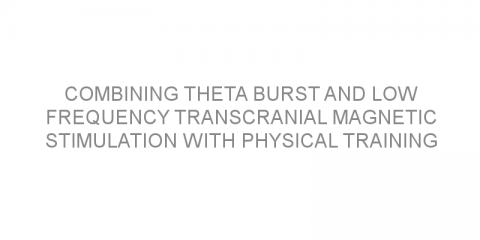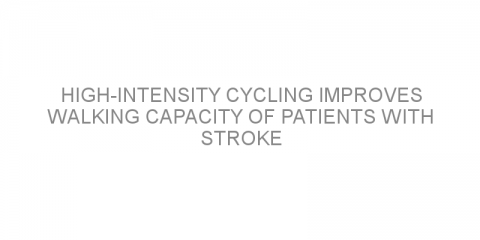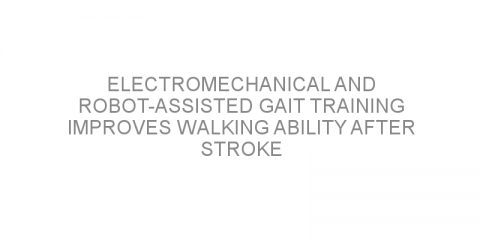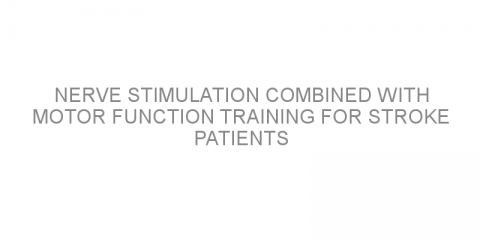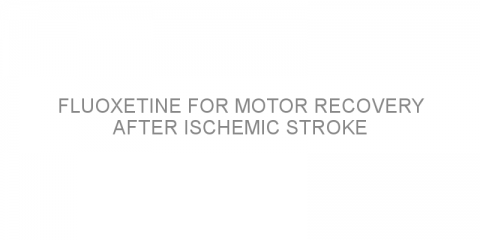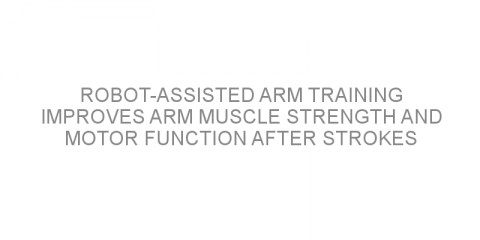In a nutshell This study investigated the effect of theta-burst stimulation (TBS) and low-frequency magnetic stimulation (LFMS) in patients with stroke and arm impairment. Researchers suggested that TBS and LFMS combined with physical therapy improved arm function in these patients. Some background Stroke is one of the main causes of chronic...
Read MoreDegree of disability-4 = Moderately severe disability Posts on Medivizor
High-intensity cycling improves walking capacity of patients with stroke
In a nutshell This study investigated the effectiveness of high-intensity cycling (HIC) in improving walking capacity in patients with stroke. Researchers suggested that HIC improves the walking capacity of patients with stroke. Some background Stroke is the leading cause of serious, long-term disability in the US. It happens when a blood clot...
Read MoreElectromechanical and robot-assisted gait training improves walking ability after stroke
In a nutshell This study reviewed the effectiveness of electromechanical- and robot-assisted gait training (ERGT) in treating impaired gait (walking) after stroke. Researchers suggested that ERGT combined with physiotherapy improves the walking ability of these patients. Some background A stroke occurs in more than 795,000 patients in the US. It...
Read MoreBackward walking training improves walking and balance in stroke survivors
In a nutshell This study investigated the effectiveness of backward walking (BW) training in the treatment of patients with stroke. Researchers suggested that BW improves walking, including speed and balance in stroke survivors. Some background Stroke is a major health problem in the US with more than 795,000 new cases every year. It happens when the...
Read MoreLooking for participants with chronic stroke to test a device-assisted treatment
In a nutshell This study is examining the effectiveness of a device-assisted practice of activities of daily living (ADL) to treat disability in stroke survivors. The main outcome to be measured will be the change in movement of the affected arm/hand. This study is being conducted in Illinois, US. The details A stroke happens when the blood flow to...
Read MoreLooking for patients to test a new treatment for arm spasticity after stroke
In a nutshell This trial is examining the effectiveness and safety of Daxibotulinumtoxin A (DAXI) in the treatment of arm stiffness after a stroke. The main outcome to be measured is the change in muscle strength. This study is being conducted in California, Connecticut, Florida and Kansas, the US. The details Patients who had a stroke often...
Read MoreNerve stimulation combined with motor function training for stroke patients
In a nutshell This trial examined whether nerve stimulation combined with motor function training improved motor function in stroke patients. They found that peripheral nerve stimulation and motor function training is effective for patients with severe upper extremity motor impairment. Some background Stroke patients are...
Read MorePoststroke exercise – the benefits
In a nutshell This review aimed to describe the benefits of physical activity and cognitive training for stroke patients. The authors concluded that aerobic exercise combined with resistance exercise was more beneficial than either alone. Some background Stroke patients commonly experience motor or cognitive disabilities that can affect their...
Read MoreLooking for participants with tetraplegia to test system for recording brain activity
In a nutshell This study located in Pittsburgh, Pennsylvania, United States aims to determine the safety and efficacy of using two NeuroPort Arrays (electrodes) in recording brain activity which can be used to control external devices. The outcome that will be studied is the safety of the participants and the efficacy of the electrodes. The...
Read MoreFluoxetine for motor recovery after ischemic stroke
In a nutshell This trial examined the benefits of fluoxetine (Prozac or Fontex) in the motor recovery of patients who suffered a stroke. Some background More than half of stroke survivors continue to experience some degree of motor deficit (loss of muscle strength or function due to nerve damage) after a stroke. Hemiplegia (paralysis of the...
Read MoreSelective serotonin reuptake inhibitors for stroke recovery
In a nutshell This meta-analysis (an analysis of data combined from several similar trials) examined the benefit of selective serotonin reuptake inhibitors (SSRI's) in the rehabilitation of patients who suffered a stroke. Some background More than half of stroke survivors continue to experience motor deficits (loss of muscle strength or...
Read MoreRobot-assisted arm training improves arm muscle strength and motor function after strokes
In a nutshell This meta-analysis (an analysis of data combined from several similar trials) examined whether robot-assisted arm training could accelerate motor recovery as part of rehabilitation after stroke. Some background More than half of stroke survivors continue to experience reduced arm function due to nerve damage. This can restrict...
Read More
